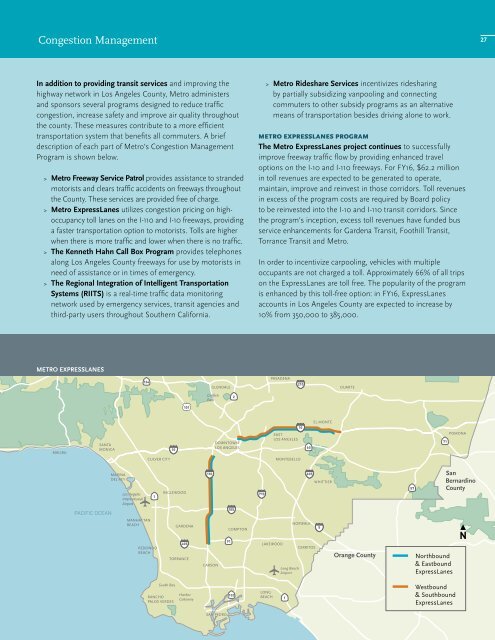Adopted Budget
XEhJr
XEhJr
Create successful ePaper yourself
Turn your PDF publications into a flip-book with our unique Google optimized e-Paper software.
Congestion Management<br />
27<br />
in addition to providing transit services and improving the<br />
highway network in Los Angeles County, Metro administers<br />
and sponsors several programs designed to reduce traffic<br />
congestion, increase safety and improve air quality throughout<br />
the county. These measures contribute to a more efficient<br />
transportation system that benefits all commuters. A brief<br />
description of each part of Metro’s Congestion Management<br />
Program is shown below.<br />
> Metro Freeway service Patrol provides assistance to stranded<br />
motorists and clears traffic accidents on freeways throughout<br />
the County. These services are provided free of charge.<br />
> Metro expresslanes utilizes congestion pricing on highoccupancy<br />
toll lanes on the I-110 and I-10 freeways, providing<br />
a faster transportation option to motorists. Tolls are higher<br />
when there is more traffic and lower when there is no traffic.<br />
> The kenneth hahn call Box Program provides telephones<br />
along Los Angeles County freeways for use by motorists in<br />
need of assistance or in times of emergency.<br />
> The Regional integration of intelligent Transportation<br />
systems (RiiTs) is a real-time traffic data monitoring<br />
network used by emergency services, transit agencies and<br />
third-party users throughout Southern California.<br />
> Metro Rideshare services incentivizes ridesharing<br />
by partially subsidizing vanpooling and connecting<br />
commuters to other subsidy programs as an alternative<br />
means of transportation besides driving alone to work.<br />
Metro expresslanes prograM<br />
The Metro expresslanes project continues to successfully<br />
improve freeway traffic flow by providing enhanced travel<br />
options on the I-10 and I-110 freeways. For FY16, $62.2 million<br />
in toll revenues are expected to be generated to operate,<br />
maintain, improve and reinvest in those corridors. Toll revenues<br />
in excess of the program costs are required by Board policy<br />
to be reinvested into the I-10 and I-110 transit corridors. Since<br />
the program’s inception, excess toll revenues have funded bus<br />
service enhancements for Gardena Transit, Foothill Transit,<br />
Torrance Transit and Metro.<br />
In order to incentivize carpooling, vehicles with multiple<br />
occupants are not charged a toll. Approximately 66% of all trips<br />
on the ExpressLanes are toll free. The popularity of the program<br />
is enhanced by this toll-free option: in FY16, ExpressLanes<br />
accounts in Los Angeles County are expected to increase by<br />
10% from 350,000 to 385,000.<br />
meTRo exPResslanes<br />
2<br />
71<br />
Northbound<br />
& Eastbound<br />
ExpressLanes<br />
Westbound<br />
& Southbound<br />
ExpressLanes


